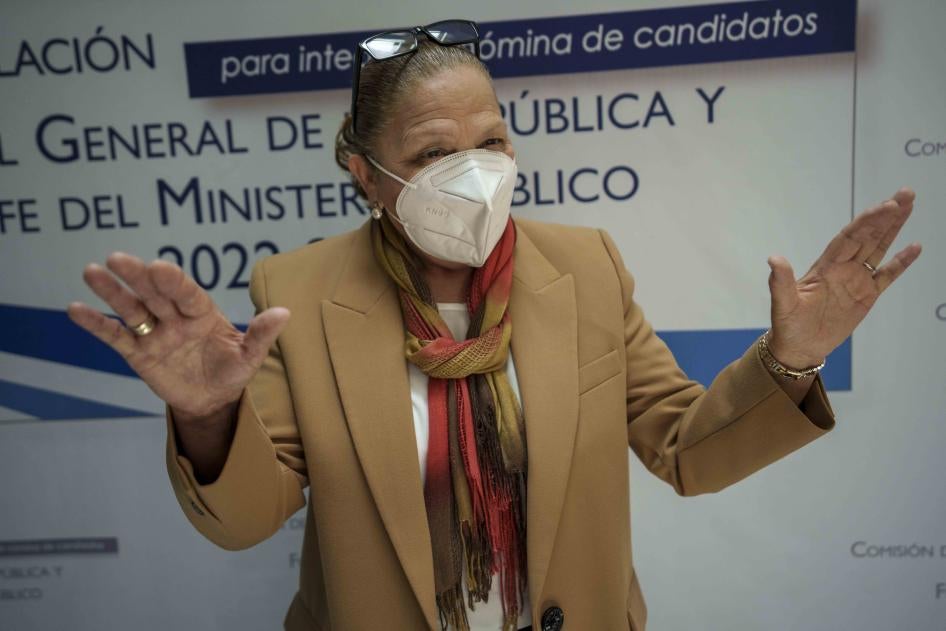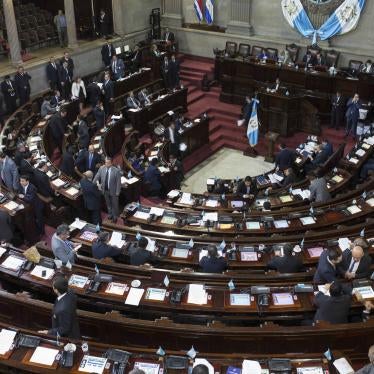(Washington, DC) – The appointment of a new attorney general in Guatemala should be the result of a public, transparent, and independent process, Human Rights Watch said today. Concerned governments should closely monitor the process and sanction individuals, including from the private sector, engaged in ongoing efforts to undermine the rule of law in the country.
A nominating commission is expected to present a short list of six candidates by April 20, 2022. President Alejandro Giammattei will appoint the new attorney general to succeed Attorney General Consuelo Porras, whose term will expire in May. During her four years in office, she has undermined investigations into corruption and human rights abuses, and brought arbitrary criminal proceedings against journalists, judges, and prosecutors.
“Consuelo Porras’ tenure as an attorney general has been a disgrace for the rule of law in Guatemala,” said Tamara Taraciuk Broner, acting Americas director at Human Rights Watch. “Her successor could play a pivotal role in defending democratic institutions – or deliver the final blow that spells their demise.”
The selection process, which began in January, is conducted by a 15-member nominating commission composed of the Supreme Court of Justice president, the deans of all law schools in the country, and two representatives of the Guatemalan bar association.
The commission is currently considering 15 candidates, including Attorney General Porras; the current solicitor general, Jorge Luis Donado; and the director of the presidential commission against corruption, Oscar Dávila.
In a letter sent to the commission on March 16, Human Rights Watch urged the members to thoroughly evaluate whether each candidate’s proven professional record indicates they would be willing and able to ensure the smooth functioning of the criminal justice system and to act impartially in administering justice. The commission should ensure that all shortlisted candidates have proven themselves to be of the highest personal integrity. Each commission member should provide a clear, public justification for their decisions, including on which candidates they support.
The selection process has been marred by several attempts to interfere with the nominating commission’s independence and the fairness of the process.
On April 6, Attorney General Porras warned nominating commission members that they could face “legal consequences” if they considered a lawyer’s claim that Porras had plagiarized her doctoral thesis. Porras said the commission was not entitled to look into the claim because there had not been a judicial ruling that she committed plagiarism.
On January 23, Guatemala’s Foreign Ministry issued a news release accusing embassies, including from the United States and European countries, of “interfering in internal affairs” after they asked the commission for a meeting to learn about its work and how the embassies could support it. After the government issued its news release, the embassies canceled their request.
The Foundation against Terrorism (Fundación contra el Terrorismo), a right-wing nongovernmental organization that supports Attorney General Porras’ reelection, has filed several lawsuits that appear designed to undermine the independence and fairness of the nominating process. The foundation’s past complaints against prosecutors, judges, and anti-corruption officials have led to several investigations and prosecutions during Porras’ tenure, and the foundation has at times announced decisions by the attorney general’s office before they have been officially made public. The United States has sanctioned leading figures of the foundation for allegedly obstructing criminal proceedings involving corruption. Their lawsuits include:
- On February 1, the foundation presented a criminal complaint against David Gaitán, a commission member and then-dean of Da Vinci University’s law school who had been spearheading an effort in the commission to more thoroughly examine candidates’ track records. The complaint accused Gaitán of the crime of “abuse of power” by not having a master’s degree, a requirement for a dean under the university’s internal guidelines. The law school said it had waived the requirement in his case. The Attorney General’s Office swiftly moved forward with a criminal investigation: on February 2, prosecutors requested information from the law school about Gaitán’s appointment. On February 3, Gaitán resigned from the commission, and the commission abandoned his efforts to conduct a thorough evaluation of candidates. The investigation against Gaitán remains open.
- On February 1, the foundation filed a lawsuit asking courts to rule that candidates’ time as trial judges should not count as part of the 10 years of professional experience the constitution requires for an attorney general. On February 17, the Constitutional Court issued a “preliminary ruling” in the foundation’s favor, reversing a 2014 precedent. While the Constitutional Court is not bound by precedent, the sudden change of rules blocked the candidacy of several high-profile anti-corruption judges who had expressed their interest in running, or who had run before and were expected to again. These included judge Erika Aifan, who was presiding over a corruption case that implicated President Giammattei, and who has faced several seemingly spurious criminal charges filed by the foundation.
- On February 17, the foundation’s president threatened to file a criminal complaint against Landívar University, whose law school dean is a member of the nominating commission, after the university held a virtual academic event with Juan Francisco Sandoval, the widely respected former head of the Special Prosecutor’s Office against Impunity (Fiscalía Especial contra la Impunidad, FECI) who has sought asylum in the United States. Several seemingly spurious arrest warrants are pending in Guatemala against Sandoval. Later, the foundation’s president filed a criminal complaint against the dean, saying he was being used as an “instrument” of Helen Mack, a human rights defender, and the US embassy in Guatemala to “press” the nominating commission into appointing a “left wing” attorney general. The foundation’s president presented a copy of the complaint to the nominating commission, asking it to put a “stop” to the dean’s alleged pressure. The commission members said publicly that he had not pressured them.
In recent years, investigations by the United Nations-backed International Commission against Impunity in Guatemala (CICIG) – shuttered by the administration of former President Jimmy Morales in 2018 – and the Attorney General’s Office exposed corruption schemes in all three branches of government. However, Attorney General Porras has taken Guatemala several steps back in the fight against corruption and regarding efforts to ensure accountability for human rights violations.
In September 2021, the United States included Porras – and her assistant Ángel Pineda – in its Undemocratic and Corrupt Actors List, popularly known as the “Engel list,” saying that they “obstructed investigations into acts of corruption by interfering with criminal investigations.”
Porras used her mandate to block corruption investigations that implicated senior politicians, and weaponized the justice system against government critics, journalists, and independent judges and prosecutors, Human Rights Watch said. Under her leadership, the Attorney General’s Office undermined criminal proceedings by removing or transferring prosecutors leading efforts to investigate and prosecute those involved in corruption and other crimes.
Since Porras took office, 13 prosecutors and five judges have fled Guatemala in connection with seemingly spurious criminal investigations against them. Several other prosecutors resigned.
Concerned governments, including from the United States and Europe, should closely monitor the selection process and expand their sanctions against people who are actively engaged in efforts to undermine the Attorney General’s Office’s independence and who seek to dismantle the rule of law, Human Rights Watch said.
They should also examine the responsibility of businesspeople in Guatemala in corrupting the rule of law. Years of investigations in Guatemala have shown that businesspeople have acted in coordination with corrupt officials to pack the courts and that money obtained through corruption and criminal activity is often used to finance electoral campaigns. Few of them have been hit with sanctions, and corruption remains entrenched among some of Guatemala’s business elites.
“Officials and corrupt businesspeople are putting Guatemala’s democratic institutions at serious risk,” Taraciuk Broner said. “International attention and robust action are urgently needed to protect the country’s democracy.”








